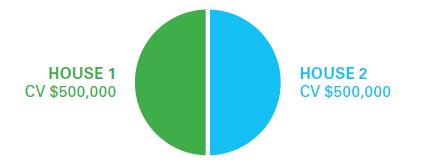There is more to how rates are set using capital values than just the value. So an increase or decrease in your capital value does not necessarily mean there will be an equivalent increase or decrease in your rates. Any change in value will not affect your property until the new rating year begins.
At a very basic level there are three steps:
- Council works out how much income is needed from rates in order to run the city as set through the Long Term Plan and Annual Plan.
- Some rates are for specific things such as water supply. These are called targeted rates and are charged only to the properties that use these services. Targeted rates are not calculated using the capital value method.
- The 'general rate' rate money is collected to fund things that benefit the general good of the city like roads and parks maintenance. The general rate amount is then spread across the city in amounts proportional to each property's capital value compared to the total value of the city.
For example, if there were only two properties in the city each worth $500,00, then each property would pay 50% of the general rates required to run the city. This is because each house makes up half of the total value of the city.

If, when they are re-valued, house 1 is still worth $500,000 but house 2 is now worth $750,000, then they would no longer pay the same amount of rates. House 1 would pay less than 50% and house 2 would pay more because each pay a share of the rates in proportion to the value of their house compared to the value of the city as a whole. In this case 40% and 60% respectively.

If you think of Council's rates revenue as a pie, the size of the pie does not get any bigger as a result of the revaluation. However, an individual property's slice of the pie might get bigger or smaller depending on how the value of the property changed in relation to the average change of the city.
Only rates charged on the basis of capital value will be affected by the revaluation. In Upper Hutt these rates are the general rate, storm water and water fire protection. Water and wastewater (pan) will not be affected by any change in capital value.